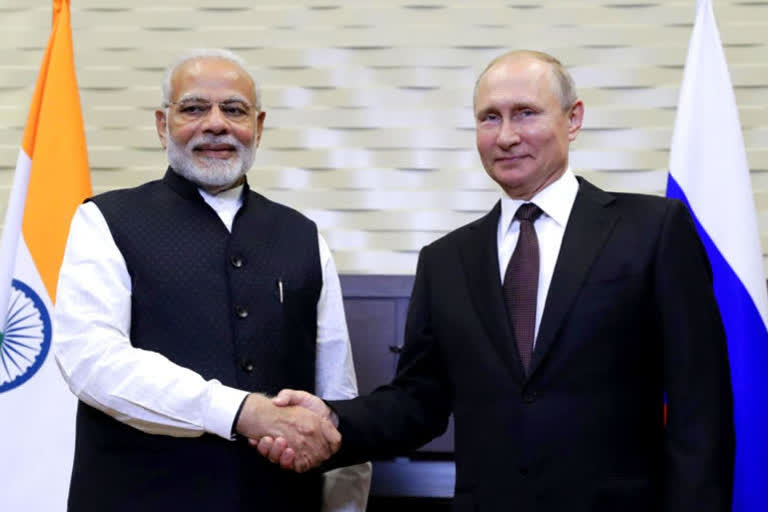Hyderabad: As Narendra Modi is set to become the first Indian Prime Minister to preside over a UN Security Council (UNSC) debate on Monday with Russian President Vladimir Putin in attendance, what is pertinent to note is that the day also marks the 50th anniversary of the signing of the Treaty of Peace, Friendship and Cooperation between India and the then Soviet Union.
Modi will address the debate on ‘Enhancing Maritime Security - A Case for International Cooperation’ via virtual mode. Apart from Putin, the meeting is expected to be attended by several heads of state and government of member states of the UNSC, and high level briefers from the UN system and key regional organisations, according to a statement issued by the External Affairs Ministry. The open debate will focus on ways to effectively counter maritime crime and insecurity and strengthened coordination in the maritime domain.
Also read: India-Russia ties among steadiest of major relationships in the world: EAM Jaishankar
Ahead of the debate, Congress leader Jairam Ramesh, in a series of tweets on Monday recalled that it was on this day, 50 years ago, that the the historic Indo-Soviet Treaty of Peace, Friendship and Cooperation was signed in New Delhi.
“This strengthened India’s hands immeasurably in the tense and crucial months to follow during the war with Pakistan and the liberation of Bangladesh,” he tweeted.
Ramesh, referring to his 2018 biography “Intertwined Lives: P.N. Haskar and Indira Gandhi”, also mentioned a diplomatic anecdote in the run-up to the signing of the treaty wherein the then Soviet Foreign Minister Andrei Gromyko had to bow to the wishes of then Indian Prime Minister Indira Gandhi.
“The Soviet Foreign Minister Andrei Gromyko initially planned to return to Moscow via Pakistan after signing the Treaty. Indira Gandhi asked a message to be conveyed to him that in that case he needn’t bother to come. Gromyko came, signed and returned to Moscow directly,” he said in a separate tweet.
In his book, Ramesh writes: “The original Soviet idea even till early-August 1971 was to have the two heads of government sign the treaty in Moscow with the two foreign initialing it in New Delhi. Ultimately, however, it was signed by the two foreign ministers in New Delhi. Not only that, Andrei Gromyko, the Soviet foreign minister, was prevailed upon not to visit Pakistan on his way back after the treaty had been signed on 9 August, 1971.”
Following the dissolution of the Soviet Union in the early Nineties, ties between India and the newly-formed Russian Federation continued to gain momentum. India-Russia ties were upgraded to a “Strategic Partnership” during President Putin's visit to India in 2000. This was further elevated to that of a “Special and Privileged Strategic Partnership” when he visited New Delhi in 2010. Russia is one of only two countries with which India holds annual bilateral summits, the other being Japan.
Also read: India, Russia to establish a '2+2 ministerial dialogue' between foreign, defence ministers
Defence cooperation is a key pillar under the ambit of “Special and Privileged Strategic Partnership” between the two countries. This cooperation has evolved from a buyer-seller framework to one involving joint research, development and production of advanced defence technologies and systems, according to the Ministry of External Affairs.
These include the BrahMos missile system as well as the licensed production in India of SU-30 aircraft and T-90 tanks. An agreement on the cooperation in the production of spare parts for Russian/Soviet military equipment was signed during the 20th Annual Bilateral Summit between Modi and Putin in Vladivostok in September 2019.
Earlier, during the 17th summit held in Goa in October 2016, the two sides concluded agreements on supply of S-400 air defence systems, construction of frigates under Project 1135.6 and shareholders agreement on the formation of joint venture to manufacture Ka-226T helicopters in India. The two countries also hold exchanges and training exercises between their armed forces annually.
On the multilateral front, Russia is a leading supporter of India's bid for permanent membership in the UNSC and New Delhi's inclusion in the Nuclear Suppliers Group. The two sides also stay on the same page in organisations like Brazil, Russia, India, China, South Africa (BRICS) and Shanghai Cooperation Organisation.



